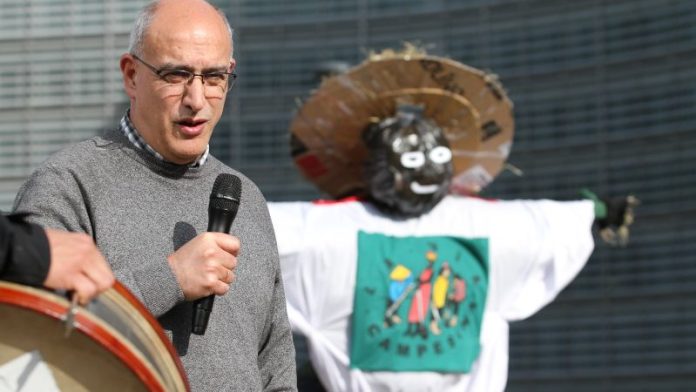The EU should control agricultural prices and abandon its policy of free trade agreements (FTAs), a spokesperson for the farmers’ organisation European Coordination Via Campesina (ECVC) stated, according to Euractiv.
The Via Campesina movement, founded in 1993 to organise family and small farmers around the world to fight globalisation, invented the term “food sovereignty.” Andoni Garcia Arriola, a Spanish farmer and a member of the organisation’s coordinating committee, said:
The ECVC proposes to paralyse negotiations with Mercosur and freeze existing free trade agreements.
The agreement with the Latin American bloc Mercosur, formed by Argentina, Brazil, Paraguay, and Uruguay, has been put on the sidelines amid farmer protests, a campaign for European Parliament elections, and new concerns from EU countries about the impact of the FTA on the agricultural sector.
Nevertheless, the EU may be preparing to sign the agreement in the coming months, the EU’s lead negotiator Rupert Schlegelmilch told Brazilian media in May. Once signed, the agreement will require the support of the European Parliament and a qualified majority of Council member states representing at least 65 per cent of the EU population.
However, the possibility seems increasingly unlikely as French national-oriented parties, strengthened after the country’s legislative elections in July, intend to oppose it. Garcia emphasised that the free trade policy favours the “substitution” of local agricultural products for imported ones.
This depresses domestic prices.
Mercosur deal
The agricultural sector has voiced its opposition to new trade agreements during the recent farmer protests sweeping across Europe in the first months of 2024. Farmers fear that the Mercosur deal will lead to markets being flooded with cheaper products from agricultural countries, such as Argentina and Brazil, if imports are liberalised under the agreement.
However, according to the European Commission, the EU-Mercosur agreement will only allow 99,000 tonnes of beef to be imported into the EU with a 7.5% preferential duty, representing only 1.2% of the EU’s annual beef consumption. As for poultry, the agreement will eliminate duties on 180,000 tonnes of meat entering the EU, representing about 1.2% of the bloc’s consumption.
Despite the small volume of imports, Garcia is still pushing to regain control of EU food production, which should include tighter market regulations and more farm labour.
We also need to respect the food sovereignty of third countries. We expect the [EU] agri-food policy and trade policy to involve much more the single market and local food production in a model of sustainable agriculture.
